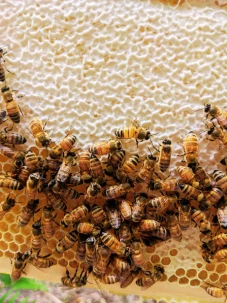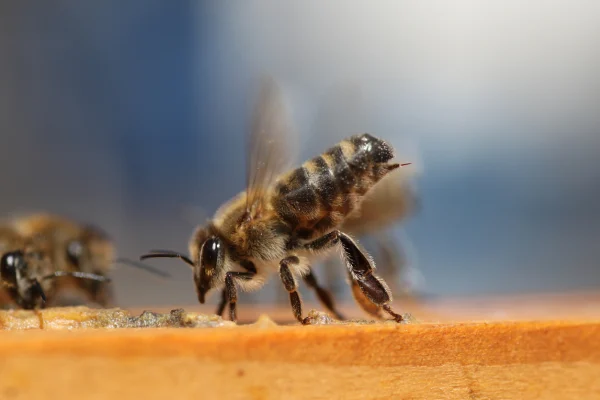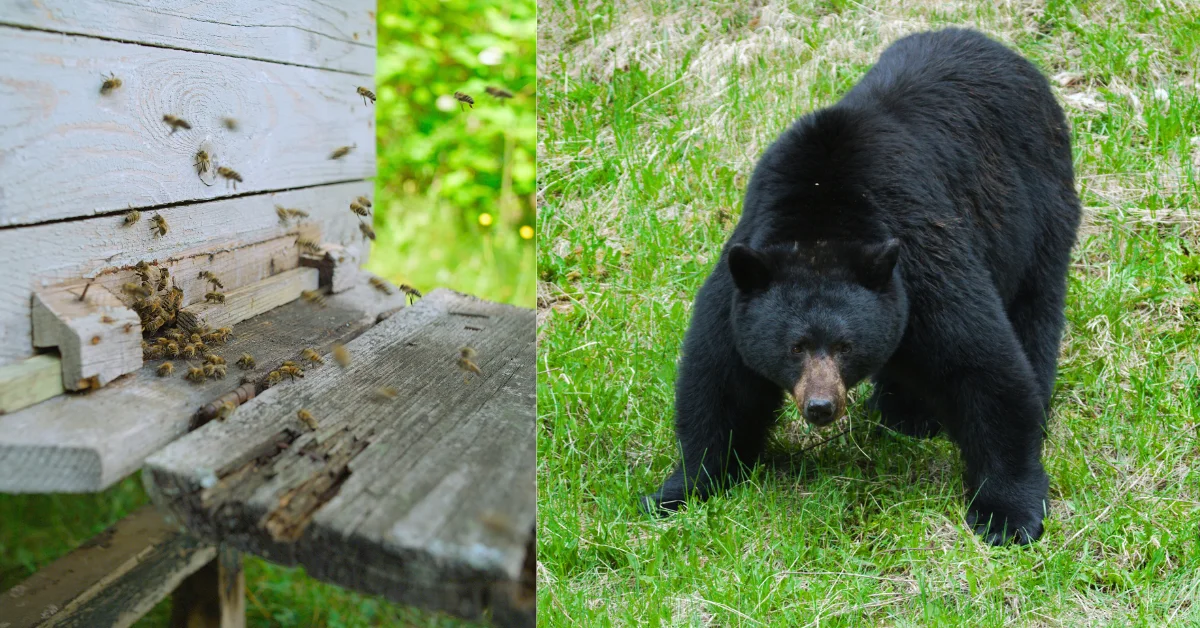When a bear attacks a beehive it creates devastating effects on the hive. Bees don’t leave him without doing anything. Bees also attack the bears to protect their hive. But the fact is “Do bears feel bee stings?”.
Bears, with their thick skins, may not experience bee stings in the same way humans do, but they do feel a slight impact. Despite their resilience, bears tend to swiftly retreat after extracting honey from a beehive, indicating that they are sensitive to the discomfort of bee stings.
Do, you want to know why a bear attacks a beehive and how bees react? Then keep reading.
Why Do Bear Attacks On A Beehive?
Bears are carnivorous means they are vegetarian and non-vegetarian too. So, they can eat grass as well as meat.
They love consuming honey and tend to feel attracted to honey. This is the main reason why bears attack a beehive.

Bear also likes bee broods and larvae. So, in general, beer attacks a beehive for the following reasons.
- When the bear is hungry and finds a beehive. It will immediately attack the beehive.
- When it gets the smell of honey.
- Whenever the bear sees brood and larvae present in the hive.
A few months ago one morning, I went to visit my apiary and discovered a shocking thing. One of my beehives is almost destroyed. Honey and a lot of dead bees are on the ground around the hive.
I was shocked and didn’t know what the heck had happened overnight. I saw everything in the right place last day. There wasn’t any disaster overnight. So, how did things go so bad at one night?
There were only a few bees remaining in the hive. 60% of the hive is destroyed. Fortunately, there was a CCTV close to my apiary.
After watching the previous night’s CCTV footage, I find the following thing in the video below.
Then I got that the bear attacked the hive last night and did this destruction. Fortunately, the queen of that hive was alive within the remaining bees. So, I split the hive and placed the bees on a new beehive.
There was excess honey and broods present in the beehive. These probably attracted the bear. When the bear attacked the hive, worker bees tried to defend the colony. Thus the result is the bear destroyed to the colony.
In the United States, it is often heard that black bears destroyed beehives. This is why beekeepers need to be extra careful about protecting hives from a bear’s attack.
Do Bears Get Stung By Bees?
Whenever a bear attacks a beehive bees won’t be nice to him. Bees try their best to protect their colony at any cost. So, they jointly attack the bear.
As most of the body parts of the bear are covered with long dense hair, bees are not able to attack those areas. But they try to sting the bear on its mouth and hands. So, bears get stung by bees in the mouth and hands.
Do Bears Feel Bee Stings?
Bears have thick skin, so they might not feel bee stings like humans. But yes they feel bee stings a little. That’s why Bear tries to run away as soon as he gets enough honey from the beehive.

Whenever bears try to steal honey from the hive, the swarm attacks him. Because a beekeeper knows how to extract honey without making bees mad. But a bear doesn’t consider that and he doesn’t even care about anything else.
So, the main aim of the bear is to steal honey from the beehive. He will go rough for the honey stolen process. Thus bees will also reply by stinging the bear.
The bear won’t feel much pain. But when a large swarm attacks him, he won’t feel comfortable. It will be painful for him. So, he will try to run away after consuming honey.
So, it is clear that bears can feel bee stings. The difference is the intensity of pain is very less compared to when a human gets stung by bees.
Are Bears Immune To Bee Stings?
Bears are blessed with thick skin, which acts like a cozy, protective layer. When a bee attempts to sting a bear, its stinger often can’t penetrate deeply due to this natural armor. This means bears have some sort of immunity to the full impact of bee stings.
But it doesn’t mean that the bear doesn’t feel bee stings. Bears obviously feel a bee sting but not with the full impact of a bee sting. If a large swarm attacks a bear, he won’t be able to stay there. So, he will run away to save him.
Do Bears React To Bee Stings?
When just a handful of bees sting a bear, the discomfort is often minimal, allowing the bear to carry on enjoying the honey and larvae. However, if a swarm of bees launches a concerted attack, the pain escalates, prompting the bear to react in a way that can be quite destructive for the bees’ hive.
Bears have a large pair of hands. So, it will try to swing its hand to drive fear to the bees. Also, it will start destroying the colony and beehive. When it starts feeling much pain, it will run away.
Frequently Asked Questions
Do bears eat bees?
Bear can eat honey, larvae, and large honey bees too. When a bear attacks a beehive honey bees try to defend the hive. So, the bear will try to kill the bees and can consume some of them if needed.
Why do bears love honey?
Honey is sweet and delicious. Bears love sweet foods. They feel attracted to the smell of honey. This is why they love honey.
Do bears fear bees?
No, the bear doesn't have any fear of bees. In case, the bear gets attacked by a large bee swarm it tries to run away for protection. But before getting attacked by a large swarm the bear doesn't have any fear of the bees.
Final Thoughts
When bears attack a beehive, it is a disaster for both bees and beekeepers. Bear destroys the colony but bees also attack him. As bears can feel bee stings, it is painful for them too.
But bees are the victims in this case in terms of devastating effects. If you are a beekeeper, you must be alert about protecting your apiary from bears and other predators of honey bees.
The following references might be helpful for you to gather some extra knowledge about bear vs bees.
- Learn about the basic characteristics of a bear (Wikipedia).
- J. Naves, A. Ordiz, and A. Fernández-Gil, “Patterns of brown bear damages on apiaries and management recommendations in the Cantabrian Mountains, Spain.” Read the research paper.
- Check this to know if are bees afraid of humans.


